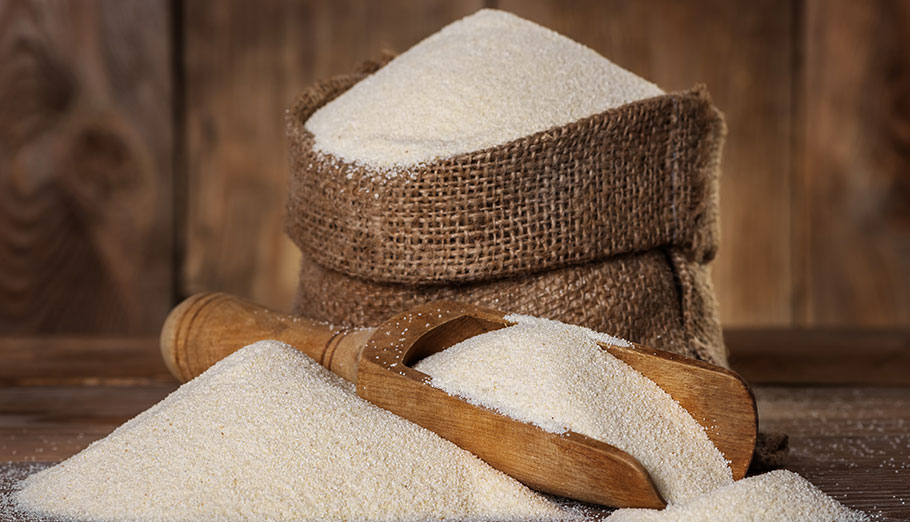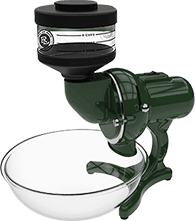Semolina

Overview (Has Gluten)
Semolina flour is made from milled endosperm of durum wheat. Durum wheat was one of the first crops to be domesticated, and evidence shows that it originally came to us from the Levant Region of the Near East and the Ethiopian Highlands about 10,000 years ago. We know it was cultivated in Byzantine Egypt, and used for traditional dishes such as couscous and tabouleh. Durum semolina is ground into a soft, yellow, coarse flour. It is high in protein, which means it is high in gluten. After it is milled into flour, this high gluten content makes it ideal for pasta, breads, pastries, porridges, and soup.
Semolina is widely used for making pasta, flatbreads and pizza dough.
Semolina flour comes in various grades, which could be roughly categorized into coarse, fine and superfine. A coarse grade is used for dusting bread, baking trays, and canvases. Fine grade is used in semolina pasta and combined with other flours in the baking of breads. Superfine semolina is used to bake pastries, cakes, and deserts.
Nutrition
The nutritional analysis of whole wheat semolina shows that it is high in protein, however, it does not contain the same nutrients as durum wheat, because the germ and bran have been removed.
Note: Weight of a cup (or partial cup) of flour varies depending upon whether it is lightly sprinkled into a measuring cup or compacted. Most recipe measurements are based on sifted flour as a way to arrive at more uniform measurement.
Gluten Content & Allergen Information
Semolina contains a high percentage of gluten. Those with Celiac disease and other forms of gluten intolerance should stay away from semolina flour and foods that contain semolina. Traditional pasta recipes, pizza crusts, and many breads contain semolina flour.
Gluten intolerance is a physical condition in the gut. Undigested gluten proteins stay in your intestines and are treated by your body like a form of food poisoning. The gluten irritates your small intestine and flattens the microvilli along its walls. Without the microvilli, you have less surface area with which to absorb the nutrients from your food.
Nutrition Facts
| Serving Size | 1 Cup |
| Calories | 601 |
| Total Fat 1.8g | 3% |
| Cholesterol 0mg | 0% |
| Sodium 2mg | 1% |
| Carbohydrates 122g | 41% |
| Dietary Fiber 7g | 24% |
| Total Sugars 0g |
| Protein 21g |
| Vitamin D 0mcg | 0% |
| Calcium 2mg | 1% |
| Iron 11mg | 62% |
| Potassium 0mg | 0% |
* The % Daily Value (DV) tells you how much a nutrient in a serving of food contributes to a daily diet. 2,000 calories a day is used for general nutrition advice.
Diet Compatibility
Paleo Diet
The Paleo Diet seeks to emulate the hunter-gatherer diet of our stone-age ancestors. The emphasis is on wild plants and meats similar to what ancient man would have consumed. As such, dairy products, refined sugar and processed oils are off limits. While many Paleo Diet followers also avoid grains, there is ample archaeological evidence to show that grains were part of Paleolithic era man’s diet.
Compatibility with Semolina Flour:
Compatible in small amounts

Mediterranean Diet
This diet seeks to emulate the diets of those living along the Mediterranean coast, with an emphasis on fresh fruits and vegetables, seafood/fish at least twice a week, limited servings of poultry, and only occasional sweets and red meat.
Compatibility with Semolina Flour:
Compatible

Gluten-Free Diet
As the name suggests, the gluten-free diet eliminates all foods with gluten. Although most of those on a gluten-free diet are on it out of necessity—either due to severe wheat allergies or Celiac disease—many have embraced a gluten-free diet as being healthier.
Compatibility with Semolina Flour:
Not Compatible

Macrobiotic Diet
Although there are many versions of macrobiotic diets, the common thread is that they emphasize natural, whole foods, grown locally and organically. Whole grains, vegetables, legumes, fruits, seeds and nuts, and occasional seafood are all integral to the diet. Red meats, dairy, poultry, eggs and processed foods are off the menu.
Compatibility with Semolina Flour:
Compatible

Acid Alkaline Diet
This diet aims to restore the slightly alkaline state of the body, which is believed to be ideal. By focusing on a diet high in vegetables, fruits, sprouted grains, lentils, almonds and soy products, the goal is to have a balance of 80% alkalizing foods and 20% acid forming foods.
Compatibility with Semolina Flour:
Compatible in small amounts – Semolina Flour is condiered to be anywhere from slightly to highly acidic

Low-Carb Diet
As the name suggests, this diet focuses on reducing carbohydrates in the diet to lose weight. The theory is that by staying away from high-carb foods like pasta and bread and eating low carb, high fiber vegetables and fruits instead, your body will go into ketosis and you will lose weight. This diet is sometimes referred to as a ketogenic diet.
Compatibility with Semolina Flour:
Not Compatible

Atkins Diet
The Atkins Diet is a historically popular low carb diet, instructing dieters not to worry about their calories but to monitor and minimize their intake of sugar and carbohydrates. According to Dr. Atkins, depriving the body of its primary energy sources causes the body to burn fat.
Compatibility with Semolina Flour:
Not Compatible

“We love the mill! We use it every day for things from bread, to pastry and it is phenomenal. The biggest selling point for me was the fineness since that would mean we can really do some great pastry with it in addition to bread. It definitely has been great!"
BEN FROM NORTH CAROLINA

